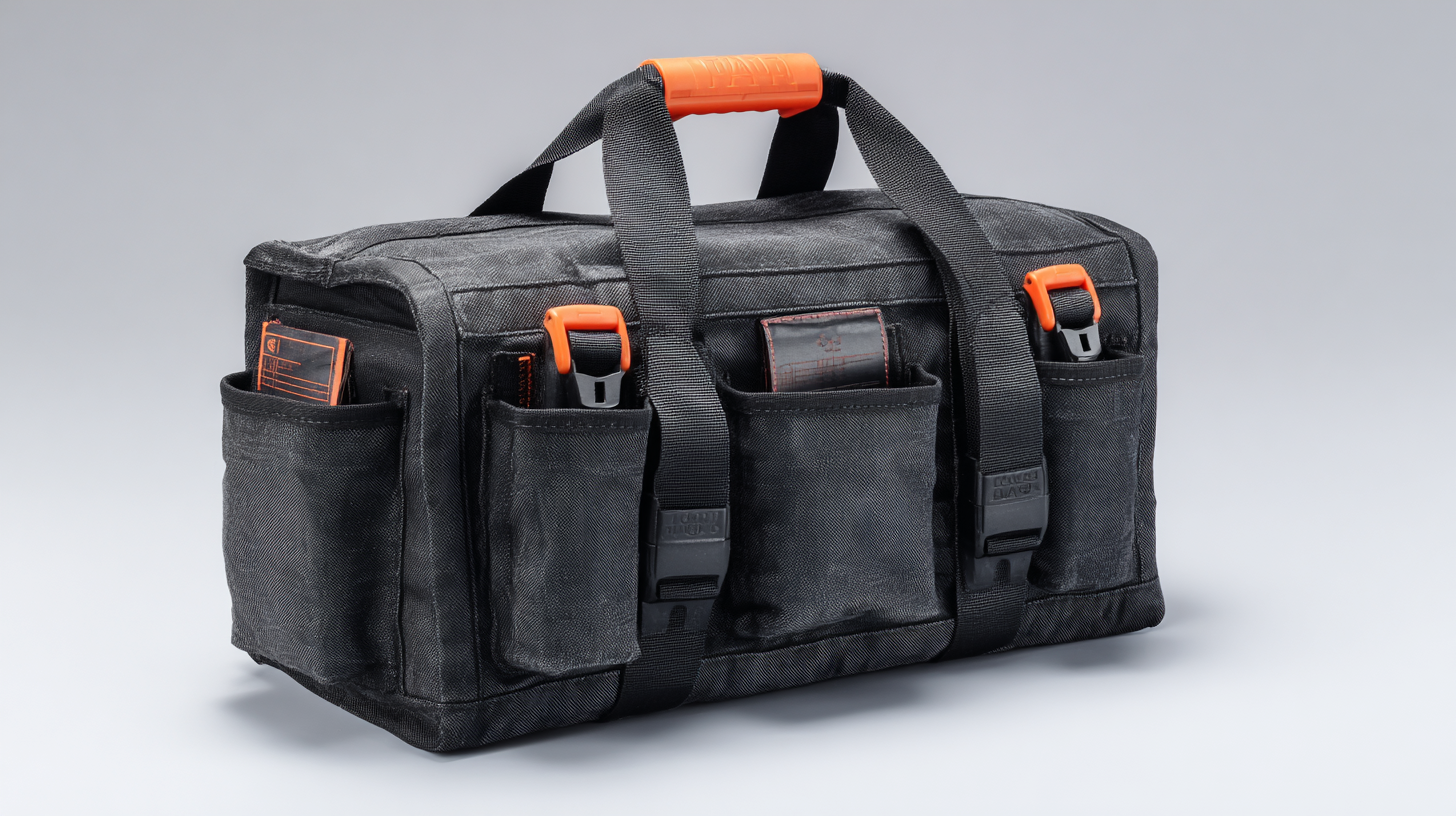- 0086-0769-87986375
- Welcome you to Dongguan Yili Bags Co., Ltd. website!
Innovative Solutions with Best Durable Tool Bag Tackling Common Industry Challenges
In today's rapidly evolving manufacturing landscape, the need for effective and resilient tools has never been more critical, and a Durable Tool Bag stands out as an essential component for industry success. According to a recent report by Fortune Business Insights, the global industrial tools market is projected to reach a valuation of over $100 billion by 2028, highlighting the increasing demand for reliable equipment and accessories. Challenges such as equipment damage, reduced productivity due to disorganized workplaces, and the ever-present need for safety compliance underline the importance of investing in high-quality tool bags. A Durable Tool Bag not only offers protection and organization for essential tools but also helps in minimizing equipment downtime, thereby enhancing operational efficiency. This blog explores innovative solutions provided by leading manufacturers in the tool bag sector and how they effectively address these common industry challenges.

Understanding the Importance of Industry Compliance in Import-Export
In today's global marketplace, understanding the intricacies of trade compliance is more crucial than ever. The recent highlights of the Philippine export and import statistics underscore the complexity of adhering to various regulations. The Philippine Statistics Authority noted an ongoing commitment to proper data dissemination, which serves as a reminder for companies to maintain compliance in their international dealings. As protectionism grows, organizations must navigate an ever-evolving landscape of laws and regulations that govern cross-border trade.

Additionally, the tightening of semiconductor regulations in Malaysia reveals the broader implications of international policies on local industries. Malaysia’s chipset exports, valued at $36.94 billion in 2024, signify a critical economic sector facing increased scrutiny due to international pressures. This scenario illustrates how companies must adapt to changing compliance requirements, emphasizing the need for robust systems to mitigate the risks associated with import-export operations. Understanding and implementing compliance measures not only ensures legal adherence but also strengthens a company's position in an interconnected global market.
Identifying Common Challenges Faced in Tool Bag Manufacturing and Distribution
In the tool bag manufacturing and distribution sector, several common challenges continue to impede progress. One significant issue is the inefficiency in supply chain management, exacerbated by various external factors, including rising costs and increased demand for quick turnaround times. As manufacturers strive to keep pace, the need for innovative solutions becomes imperative. The integration of technology into the manufacturing processes, particularly through advancements in automation and data analytics, can streamline workflows, reduce lead times, and enhance overall productivity.
Moreover, as societal changes prompt a shift towards sustainability, tool bag manufacturers face additional challenges in sourcing eco-friendly materials and implementing sustainable practices without sacrificing quality or durability. This aligns with the need for a more tech-driven approach, where adopting artificial intelligence and machine learning can optimize resource allocation and improve the design process. By addressing these challenges head-on, the industry can not only enhance the manufacturing and distribution of tool bags but also pave the way for innovative solutions that meet the evolving demands of consumers and industry standards.
Innovative Solutions with Best Durable Tool Bag Tackling Common Industry Challenges
| Challenge | Description | Proposed Solution | Impact |
|---|---|---|---|
| Durability | Tool bags often wear out quickly under heavy use. | Use high-strength materials and reinforced stitching. | Increased lifespan leading to higher customer satisfaction. |
| Organization | Tools are frequently disorganized, causing inefficiency. | Implement modular organizational systems with clear identification. | Faster tool retrieval reduces time wasted on searching. |
| Weight | Heavy tool bags can lead to exhaustion and safety concerns. | Utilize lightweight materials without compromising strength. | Reduced strain on workers and improved transportability. |
| Accessibility | Difficulty accessing tools can slow down work processes. | Design bags with easy-access pockets and openings. | Improved workflow and productivity on job sites. |
| Cost | High manufacturing costs can limit competitiveness. | Optimize manufacturing processes and materials procurement. | Enhanced pricing flexibility for consumers. |
Innovative Features of Durable Tool Bags for Enhanced Performance
Durable tool bags have evolved significantly, incorporating innovative features designed to tackle common challenges faced by professionals in various industries. One standout feature is the use of
high-grade, water-resistant materials. These bags not only protect tools from moisture but also enhance their longevity, making them a reliable choice for workers who often operate in unpredictable environments. With
reinforced stitching and heavy-duty zippers, these bags can withstand the wear and tear of daily use, ensuring that even the most demanding tasks can be handled smoothly.
Another crucial innovation is the organizational design of durable tool bags. Many brands now offer
modular compartments and customizable inserts that allow users to arrange their tools in a way that maximizes efficiency. This thoughtful design reduces time spent searching for specific tools, ultimately improving productivity on the job.
Additionally, ergonomic shoulder straps and padded handles provide comfort during transportation, minimizing strain and fatigue, which is essential for those who carry heavy loads throughout the day.
Together, these features not only enhance performance but also cater to the needs of modern tradespeople seeking both functionality and durability in their tool storage solutions.
step-by-step Guide to Navigating Import-Export Regulations Successfully
Navigating import-export regulations can often feel like deciphering a complex maze, especially for businesses looking to expand their reach. Understanding the specific requirements for documentation is crucial. Each country has its own set of rules that dictate what paperwork is needed for both importing and exporting goods. Start by familiarizing yourself with essential documents such as commercial invoices, packing lists, and bills of lading. Keeping these organized and accurate will not only facilitate smoother transactions but also help you avoid costly delays and misunderstandings with customs authorities.
Another critical factor is compliance with tariffs and customs duties. Knowing the rates that apply to your products based on their classification can significantly impact your cost calculations. Utilizing tools and resources, like import-export databases and compliance training programs, can keep you informed about changes in regulations that may affect your business. Lastly, partnering with experienced freight forwarders or customs brokers can be invaluable. These professionals can provide guidance through the complexities of trade regulations, ensuring that you adhere to legal standards while optimizing your logistical processes.
Innovative Solutions in Tackling Industry Challenges
Case Studies: Success Stories of Businesses Overcoming Industry Challenges
In today's competitive landscape, businesses face a myriad of challenges that can impede their success. One such challenge is the efficient management of tools and equipment. Companies in industries ranging from construction to automotive repair have turned to durable tool bags as a solution to enhance organization and improve workflow. A notable case study comes from a mid-sized construction firm that adopted heavy-duty tool bags, resulting in a 30% decrease in time spent searching for tools. The bags provided a systematic storage solution, allowing workers to focus more on their tasks without the hindrance of misplaced equipment.
 Another compelling success story can be observed in an automotive repair shop that struggled with clutter and inefficiency. By implementing a new line of rugged tool bags designed for mobility, technicians were able to transport their necessary tools effortlessly from one vehicle to another. This innovation increased productivity and significantly reduced the time required for repairs, showcasing how proper organization not only improves individual performance but also enhances overall operational efficiency. These examples highlight the critical role that quality tool bags play in overcoming industry challenges, encouraging businesses to seek innovative solutions for better resource management.
Another compelling success story can be observed in an automotive repair shop that struggled with clutter and inefficiency. By implementing a new line of rugged tool bags designed for mobility, technicians were able to transport their necessary tools effortlessly from one vehicle to another. This innovation increased productivity and significantly reduced the time required for repairs, showcasing how proper organization not only improves individual performance but also enhances overall operational efficiency. These examples highlight the critical role that quality tool bags play in overcoming industry challenges, encouraging businesses to seek innovative solutions for better resource management.
